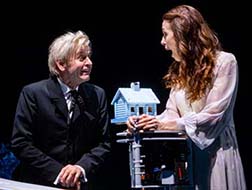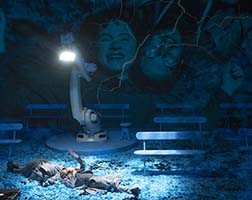
Lucy Komisar
|
“The Orchard”
features Baryshnikov and Hecht in surreal take on Chekhov “The Orchard.” Igor Golyak’s adaptation of Chekhov’s “The Cherry Orchard” stars a brilliantly effervescent Mikhail Baryshnikov, a fine dreamy Jessica Hecht, talented supporting players, a giant robotic arm topped by a ring-lit camera and a cute scampering robotic dog. And that’s only the half of it, since I saw the in-person play but not the virtual on-line version. Golyak also directed, marshalling good performances and pulling out a plot from what could have gotten lost in a three-ring atmosphere.
In the stage play, Baryshnikov is Firs, 87, the valet of an erstwhile rich Russian family. He was born a serf and can’t imagine life as anything but a servant. In the second he is Chekhov. The production, with set by Anna Fedorova, features a surreal landscape covered in crepe-paper blue leaves that sometimes swirl into the air and across the stage, versatile benches and a scrim on which words or faces appear at various times. The plot turns on the old giving way to the new, the aristocratic but reduced to penury Ranevskaya (Hecht) and the businessman Lopakhin (Nael Nacer) whose parents were peasants and grandparents serfs. The young people, daughter Anya (Juliet Brett), adopted daughter Varya (Elise Kibler) and university student Pyotr (John McGinty) are trying to make their way in the world, but you don’t give them odds of success.
Ranevskaya can’t pay the loan on the estate and will lose it. She attempts to get money from a relative and ignores Lopakhin’s plan to cut down the orchard and divide the land into plots to lease for summer homes. No more orchard, but she could keep the estate. Overlaying it all are the special effects, projected visuals and Baryshnikov. His Firs is clearly balletic, running, twisting, sometimes half stumbling but often ethereal as the confused old man. It is delightful to see the great dancer’s acting enhanced by his subtly choreographed movement.
On the other hand, the robotic arm seems gimmicky. It’s required to photograph scenes that appear on the scrim as ghostly B&W blow-ups to connect the real and virtual performances. Once it delivers coffee, another time serves as a book shelf, but otherwise its function is taking pictures. And appearing as a futuristic sculpture. The scrim also announces scene changes and could have been used to good effect to translate the signing of conversations with Pyotr, who in this adaptation is deaf (a woke distraction), the rants of a passer-by (Ilia Volok) who thunders in Russian, or the French declamations of Lopakhin. Elise Kibler is good as Varya, so hopeful behind her round glasses, who loves Lopakhin but can’t get him to propose, as is Darya Denisova as Charlotta, Anya’s governess, who had some past adventures as an acrobatic performer. Lots of dashed dreams in this absorbing production. Piano and violin music by Jakov Jakoulov set an appropriately mournful mood.
Visit Lucy’s website http://thekomisarscoop.com/ |
| museums | NYTW mail | recordings | coupons | publications | classified |



